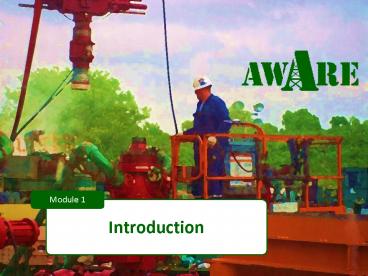Confined Space Awareness - PowerPoint PPT Presentation
1 / 20
Title:
Confined Space Awareness
Description:
Module 1 Introduction *Not enacted as an OSHA standard directly unless incorporated by reference in text Citation possible under General Duty Clause, 5(a)(1) if ... – PowerPoint PPT presentation
Number of Views:2360
Avg rating:3.0/5.0
Title: Confined Space Awareness
1
Module 1
Introduction
2
Disclaimer
- This material was produced under grant number
SH-22248-1 from the Occupational Safety and
Health Administration, U.S. Department of Labor.
It does not necessarily reflect the views or
policies of the U.S. Department of Labor, nor
does mention of trade names, commercial products,
or organizations imply endorsement by the U.S.
Government.
3
Oil and Gas Industry Process
Site Preparation
Drilling
Production
4
(No Transcript)
5
(No Transcript)
6
Event Causing Fatality
Event Number Percentage
struck by object/equipment 81 31
caught in/between objects/equipment 38 15
explosion 35 14
falls 27 10
contact with electricity 25 10
transportation accidents 25 10
fire 19 7
exposure to harmful environments (heat, air pressure, poisonous substances, confined space) 9 3
oil and gas industry fatality data from the
Bureau of Labor Statistics (BLS) 2005-2008
7
Worker Activity When Fatality Occurred
Worker Activity Number Percentage
repair/maintenance 37 14
construction, assembling, dismantling 35 14
materials handling operations 34 13
operating heavy equipment 32 12
operating tools/machinery 32 12
transportation 20 8
physical (climbing, reaching, etc.) 16 6
inspecting 15 6
flagging/working around traffic 13 5
cleaning/clearing/painting 13 5
other 12 5
oil and gas industry fatality data from the
Bureau of Labor Statistics (BLS) 2005-2008
8
Why is OSHA Important to You?
- OSHA was created because, until 1970, there were
no national laws for safety and health hazards - On average, 15 workers die every day from
job-related injuries - Over 5,600 Americans die from workplace injuries
annually - Over 4 million non-fatal workplace injuries and
illnesses are reported
9
What Rights Do You Have Under OSHA?
- You have the right to
- a safe and healthful workplace
- know about hazardous chemicals
- information about injuries and illnesses in your
workplace - complain or request hazard correction from
employer - training
- hazard exposure and medical records
- file a complaint with OSHA
- participate in an OSHA inspection
- be free from retaliation for exercising safety
and health rights
10
see pages 255-260
11
Refusing to Work Because Conditions are Dangerous
12
What Responsibilities Does Your Employer Have
Under OSHA?
- Provide a workplace free from recognized hazards
and comply with OSHA standards - Provide training required by OSHA standards
- Keep records of injuries and illnesses
- Provide medical exams when required by OSHA
standards and provide workers access to their
exposure and medical records - Not discriminate against workers who exercise
their rights under the Act Section 11(c) - Post OSHA citations and abatement verification
notices - Provide and pay for PPE
13
What do the OSHA Standards Say?
- OSHA standards fall into four categories General
Industry, Construction, Maritime, and Agriculture - OSHA issues standards for a wide variety of
workplace hazards - Where there are no specific OSHA standards,
employers must comply with the General Duty
Clause, Section 5(a)(1)
14
What Standards Apply to the Oil and Gas Industry?
- OSHA doesnt have a specific oil and gas standard
- The standard that applies will depend on the work
activity - most site prep work falls under 29 CFR 1926
Construction - most drilling and production activities fall
under 29 CFR 1910 General Industry - in addition to OSHA
- API RP 54, Recommended Practice for Occupational
Safety for Oil and Gas Well Drilling and
Servicing Operations
15
How Are OSHA Inspections Conducted?
- The OSHAct authorizes OSHA compliance safety and
health officers (CSHOs) to conduct workplace
inspections at reasonable times - OSHA conducts inspections without advance notice,
except in rare circumstances (e.g. - imminent
danger) - In fact, anyone who tells an employer about an
OSHA inspection in advance can receive fines and
a jail term
16
Check Out OSHAs Website
click on picture to go!
17
OSHAs Oil and Gas e-Tool
click on picture to go!
18
Memory Check
- What is the OSHA website URL?
- safety.com
- osha.gov
- niosh.gov
- none of the above
19
Memory Check
- What should you do if you believe working
conditions are unsafe or unhealthful? - keep it to yourself and forget about it
- call the county board of health
- notify your employer first and then OSHA if
necessary - go straight to OSHA
20
Memory Check
- What responsibilities does your employer have
under OSHA? - provide a workplace free from recognized hazards
and comply with OSHA standards - provide training required by OSHA standards
- not discriminating against workers who exercise
their rights under the Act Section 11(c) - all of the above































